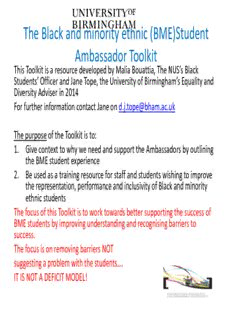
BME Ambassador toolkit PDF
Preview BME Ambassador toolkit
The Black and minority ethnic (BME)Student Ambassador Toolkit This Toolkit is a resource developed by Malia Bouattia, The NUS’s Black Students’ Officer and Jane Tope, the University of Birmingham’s Equality and Diversity Adviser in 2014 For further information contact Jane on [email protected] The purpose of the Toolkit is to: 1. Give context to why we need and support the Ambassadors by outlining the BME student experience 2. Be used as a training resource for staff and students wishing to improve the representation, performance and inclusivity of Black and minority ethnic students The focus of this Toolkit is to work towards better supporting the success of BME students by improving understanding and recognising barriers to success. The focus is on removing barriers NOT suggesting a problem with the students…. IT IS NOT A DEFICIT MODEL! CONTENT 1. Being BME at the University of Birmingham- the experience and performance of BME students -I, too, am Birmingham -The ethnicity attainment gap at UoB 2. How to be an ambassador and supporting ambassadors in the Schools -Previous work/pilot assessing the efficacy of the approach -How you can effect change 3.The Toolkit -First steps -Engaging with BME students in your School -Engaging with members of staff/academics -Creating BME safe spaces/events -Seeking support -Feedback -BME postgraduates 4. BEMA-here to help! And other resources Contacts Section1. I, too, am Birmingham What do UoB BME students say? Research was conducted in 2012/3 as part of a nationally funded project supported by the Higher Education Academy into what activities can help narrow the ethnicity attainment gap. Here are some of the views expressed by students who were individually interviewed or took part in a number of focus groups: Experienced a feeling of ‘White campus’ – BME students chose Birmingham because it’s multi-cultural, but the campus ‘feels white’ –its ambience/culture/ environment and this leads to feeling ‘othered’/’minoritised’/ in an ‘alien environment’ Important to experience a sense of belonging, respect and mutual interest and academics very important in this because students want to feel their identity is valued Segregation in lecturers and seminars happens and needs to be challenged Curriculum should reflect diversity–a ‘heart-thumping moment’ happens when students feel their perspective is understood and valued Some Schools feel more isolating than others… http://www.youtube.com/watch?v=0J_jhtlzeE0 The issues and … The attainment gap The issues include BME students are less likely to gain a place at university ( UoB = 23% UK BME ), they report poorer experiences ref. NSS, BSS, NUS’s Report ( see end references) and less likely to gain fulltime employment after graduation http://www.runnymedetrust.org/uploads/WhenEducationIsntEnough.pdf What is the attainment gap? The attainment gap measures the difference between the proportion of first degree undergraduate qualifiers who obtain a first class or upper second class honours degree. Sector ethnicity attainment gap http://www.theguardian.com/education/2014/mar/28/white-students-better-degrees-minorities-same-grades-universities http://www.ecu.ac.uk/publications/equality-in-higher-education-statistical-report-2013/ This report states the sector gap The attainment gap at UoB At the University of Birmingham there is an ethnic attainment gap of around 12%. This is variable across Schools but it remains the case that BME are less likely to gain a first class or upper second class honours degree and have a poorer poor experience. Furthermore, BME students are also less likely to finish their degree and less likely to gain a fulltime job after graduation. Some of the reasons include: -Institutional racism/unconscious bias maybe? Lower expectations and ‘folk pedagogies’ ( Singh 2012) - Feelings of isolation from BME students who expected UoB to more reflect of the wider multicultural community but finding it is a culture of exclusion -BME students feeling ‘minoritised’ and ignored -lack of diversity in the curriculum, not reflective of BME groups and diversity in gerenral -Lack of diversity amongst staff and role models The ‘gap’at the University of Birmingham College % 2010 2011 2012 2013 Arts and Law 23.2 24.2 24.5 10.9 Life and Environmental Sciences 27.0 10.8 13.0 9.0 Medical and Dentistry 4.4 4.1 12.9 11.9 Social Sciences 22.2 17.0 12.8 13.1 Engineering and Physical Sciences 24.9 20.5 8.5 15.8 University % totals 21.6 16.9 14.9 11.5 Reasons for the ‘gap’ and other research: • http://www.heacademy.ac.uk/resources/detail/retention/blac k_minority_ethnic_student_resources#publications • http://www.heacademy.ac.uk/assets/documents/retention/B ME/Uni_Birmingham_PROJECT_PLAN.pdf Final report available from [email protected] • http://www.nus.org.uk/PageFiles/12350/NUS_Race_for_Equa lity_web.pdf For an up-date on NUS’s report contact Malia
Description: